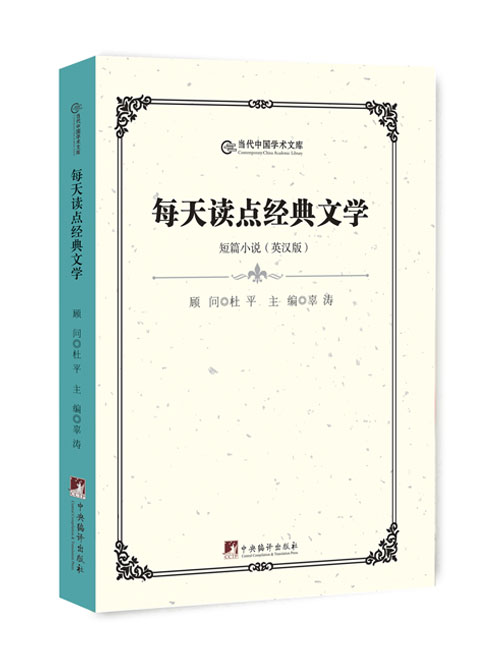
作者单位:西华师范大学
出版时间:2013年1月第1版第1次
本书概述:本系列丛书精选自欧美18~19世纪以来的著名作家经典作品,包括散文家、小说家、历史学家等等,题材丰富多样,内容深刻有趣,读来不但能陶冶情操,净化心灵,文学大师的地道英文更能在潜移默化中提高你的英文水准
作者姓名: 辜涛
出版社: 中央编译出版社
订购电话:400-6677-036
优惠活动:出书作者购书享受65%折优惠。
购书服务:满59免运费 : 由一站出版服务网发货,并提供售后服务。6:00前完成下单,预计5天可送达。
图书定价:59
内容简介
本系列丛书精选自欧美18~19世纪以来的著名作家经典作品,包括散文家、小说家、历史学家等等,题材丰富多样,内容深刻有趣,读来不但能陶冶情操,净化心灵,文学大师的地道英文更能在潜移默化中提高你的英文水准、人文素养。
本卷为短篇小说卷,挑选了乔治·爱略特、查尔斯·兰姆、乔治·桑、华盛顿·欧文、杰克·伦敦等人的经典短篇小说,进行了精心翻译。有些是第一次翻译成中文,一定能使你有最新鲜的阅读乐趣,有些则是在前面译者的基础上改进翻译,也许能让你温故而知新。小说内容广泛,从战争的残酷到旅行的乐趣,从读书岁月乃至家庭的生活,从各个方面深刻地探讨了人性的宽容和伟大、动物的善良和有趣、世界的博大和多彩,读来有趣有益,并能极大地拓展你的知识面,提高你的文学素养。
为了方便读者理解,我们为每一篇文章适当补充了作者简介、单词解析等,相信能使你更好的阅读和学习,做到学有所获。本书不但适合在校的大学生作为课余补充读物,提高他们的文学素养、英文阅读能力、理解能力和翻译能力;同时也适合广大的英文自学者和文学爱好者,作为业余读物提高英语水平,在忙碌的现代生活中慢慢体会文学经典的力量,陶冶心灵。
第一卷小说卷出版之后,其他诗歌、散文卷等将随后出版,敬请关注。
作者简介
辜 涛 女,重庆大学硕士,专业翻译理论与实践,西华师范大学讲师。从事笔译实践多年,发表相关学术论文多篇。
1.A LEAF IN THE STORM, by Louise de la Ramee, from A Leaf in the Storm and Other Stories
风雨中的一片叶子/萧傅之译
2.CATS, by Maurice Hewlett, from Earthwork out of Tuscany
猫/萧傅之译
3.AN ADVENTURE, by Honore de Balzac, from A Passion in the Desert
沙漠历险记/萧傅之译
4.OUT OF DOORS, by Richard Jefferies, from Saint Guido
户外奇遇记/萧傅之译
5.THE TABOO, by Herman Melville, from Typee
禁忌/萧傅之译
6.FOR THOSE WHO LOVE MUSIC, by Axel Munthe, from Vagaries
致热爱音乐的人/辜涛译
7.SCHOOL DAYS AT THE CONVENT, by George Sand, from The Story of My Life (adapted)
修道院的读书岁月/辜涛译
8.IN BRITTANY, by Louisa Alcott, from Aunt Jos Scrap Bag
布列塔尼女人/辜涛译
9.THE ADIRONDACKS, by John Burroughs, from Wake Robin
阿地伦达山/辜涛译
10.AN ASCENT OF KILAUEA, by Lady Brassey, from Around the World in the Yacht Sunbeam
登基拉韦亚火山/辜涛译
……
A LEAF IN THE STORMA LEAF IN THE STORM
Bernadou clung to his home with a dogged devotion. He would not go from it to fight unless compelled, but for it he would have fought like a lion. His love for his country was only an indefinite shadowy existence that was not clear to him; he could not save a land that he had never seen, a capital that was only to him as an empty name; nor could he comprehend the danger that his nation ran; nor could he desire to go forth and spend his lifeblood in defence of things unknown to him. He was only a peasant, and he could not read nor greatly understand. But affection for his birthplace was a passion with him,——mute indeed, but deepseated as an oak. For his birthplace he would have struggled as a man can struggle only when supreme love as well as duty nerves his arm. Neither he nor Reine Allix1 could see that a mans duty might lie from home, but in that home both were alike ready to dare anything and to suffer everything. It was a narrow form of patriotism, yet it had nobleness, endurance, and patience in it; in song it has been oftentimes deified as heroism, but in modern warfare it is punished as the blackest crime.
So Bernadou tarried in his cottage till he should be called, keeping watch by night over the safety of his village and by day doing all he could to aid the deserted wives and mothers of the place by tilling their ground for them and by tending such poor cattle as were left in their desolate fields. He and Margot and Reine Allix, between them, fed many mouths that would otherwise have been closed in death by famine, and denied themselves all except the barest and most meagre subsistence, that they might give away the little they possessed.
And all this while the war went on, but seemed far from them, so seldom did any tidings2 of it pierce the seclusion in which they dwelt. By and by, as the autumn went on, they learned a little more. Fugitives coming to the smithy for a horses shoe; women fleeing to their old village homes from their light, gay life in the city; mandates from the government of defence sent to every hamlet in the country; stray newssheets brought in by carriers or hawkers and hucksters,——all these by degrees told them of the peril of their country,——vaguely, indeed, and seldom truthfully, but so that by mutilated rumors they came at last to know the awful facts of the fate of Sedan, the fall of the Empire, the siege of Paris. It did not alter their daily lives: it was still too far off and too impalpable. But a foreboding, a dread, an unspeakable woe settled down on them. Already their lands and cattle had been harassed to yield provision for the army and large towns; already their best horses had been taken for the siegetrains3 and the foragewagons; already their ploughshares were perforce idle, and their children cried because of the scarcity of nourishment; already the iron of war had entered into their souls.
The little street at evening was mournful and very silent: the few who talked spoke in whispers, lest a spy should hear them, and the young ones had no strength to play: they wanted food.
Bernadou, now that all means of defence was gone from him, and the only thing left to him to deal with was his own life, had become quiet and silent and passionless, as was his habit. He would have fought like a mastiff for his home, but this they had forbidden him to do, and he was passive and without hope. He closed his door, and sat down with his hand in that of Reine Allix and his arm around his wife. “There is nothing to do but wait” he said sadly. The day seemed very long in coming.
The firing (which had come nearer each day) ceased for a while; then its roll commenced afresh, and grew still nearer to the village. Then again all was still.
At noon a shepherd staggered into the place, pale, bleeding, bruised, covered with mire. The Prussians, he told them, had forced him to be their guide, had knotted him tight to a troopers saddle, and had dragged him with them until he was half dead with fatigue and pain. At night he had broken from them and had fled: they were close at hand, he said, and had burned the town from end to end because a man had fired at them from a housetop. That was all he knew. Bernadou, who had gone out to hear his news, returned into the house and sat down and hid his face within his hands.
……








